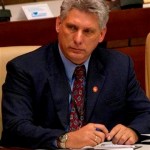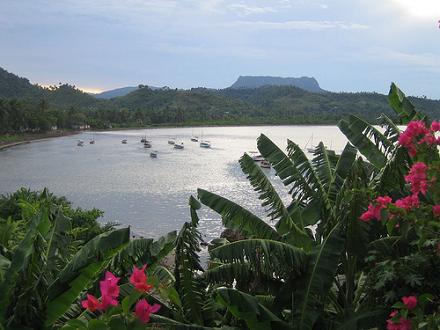Cuba began this week to transit slowly towards rule by someone whose last name is not Castro and who is too young to have fought alongside Fidel in the revolution that ushered in communism in 1959.
As Cuba tinkers with market-based economic reforms, the man to watch is the new number two guy in the regime, 52-year-old Miguel Diaz-Canel.
Diaz-Canel is a former electronic engineer who has long been active in the communist party at the provincial level and who by 2003 had worked his way up to the party Politburo under the wing of the current president Raul Castro.
He is described in state news broadcasts as a good listener, somebody who is comfortable addressing problems facing Cuban society. He is also widely seen as unpretentious and easy-going.
On Sunday, the National Assembly approved a second and final five-year term for Raul Castro, brother of the elderly but illustrious Fidel. But he joked last week that he might retire at some point, citing his age.
This at least raises the possibility that the younger Castro might not complete his term, setting the stage for Diaz-Canel to take Cuba’s helm.
For now, he is best placed to take charge, but things don’t always turn out as planned in Cuba.
In the 1990s other men emerged as likely political heirs — Carlos Lage, Felipe Perez Roque and Roberto Robaina — only to fall in disfavor after what Fidel Castro referred to opaquely as undue “ambitiousness.”
Diaz-Canel has also been described as discreet, perhaps without the charisma of 86-year-old Fidel, the iconic national hero, or Raul, who took over in 2006 when his elder brother fell ill.
If not a riveting speaker, the new guy certainly has caught the attention of many Cuban women — for his looks. Some have nicknamed him the “Cuban Richard Gere,” as he is handsome with a shock of white hair.
He has burst into the powerful 31-member Council of State as its first vice president. This marks “the start of the post-Castro era,” Cuba affairs analyst Arturo Lopez-Levy of the University of Denver told AFP.
Diaz-Canel, as political heir, cuts a starkly different profile from the revolutionary leadership, whose members are mostly in their 80s.
Lopez-Levy said Diaz-Canel stands out for three reasons: his relative youth, his gradual rise by working in the party and not through revolutionary war credentials, and for being a civilian with little military experience.
A careful speaker, the lanky politician has also led the Communist Youth Union, and went on an international “mission” to Nicaragua during the first leftist Sandinista government. He joined the Politburo in 2003.
“What happened yesterday was just the reproduction of the totalitarian model of government,” dissident Elizardo Sanchez said of Diaz-Canel’s promotion.
“The younger people are the one who are going to have to move the country forward,” movie projectionist Maria Elena Rodriguez, 60, said, happy with the new number two announced a day earlier.
“This is what we need to get out of the hole we are in,” she argued.
Cuban political scientist Carlos Alzugaray said Diaz-Canel would have his work cut out for him if he reached the top.
“No one can govern Cuba like Fidel and Raul Castro have,” he said, arguing that the next wave of leadership lacks “the charismatic legitimacy which is the key to historic leadership.”
There will be a test period in which they have to show if they have the skill and ability to press forward with the timid economic and political reforms undertaken so far in Cuba, Alzugaray argued.
In Washington, US officials said Cuba still needed to do more to ensure that the Cuban people were given the freedom to elect their own leaders.
Sources: AFP/Jean-HerveDeiller/InternetPhotos/www.thecubanhistory.com
Cuba: una transición despacio, estilo-Castro.
The Cuban History, Arnoldo Varona, Editor
Cuba: una transición despacio, estilo-Castro.
Cuba comenzó esta semana a transitar lentamente hacia el gobierno por alguien cuyo apellido no es Castro y que es demasiado joven para haber luchado junto a Fidel en la revolución que marcó el comienzo de comunismo en 1959.
Como caldereros Cuba con las reformas de mercado económicos, el hombre a vigilar es el nuevo número dos en el tipo de régimen, de 52 años de edad, Miguel Díaz-Canel.
Díaz-Canel es un ex ingeniero electrónico que ha participado activamente en el partido comunista a nivel provincial y que en 2003 se había abierto camino hasta el Politburó del partido bajo el ala del actual presidente Raúl Castro.
Él es descrito en las emisiones de noticias estatal como un buen oyente, alguien que se siente cómodo frente a los problemas que enfrenta la sociedad cubana. También es ampliamente considerado como modesto y fácil de ir.
El domingo, la Asamblea Nacional aprobó un segundo y último mandato de cinco años por Raúl Castro, hermano del ilustre anciano, pero Fidel. Sin embargo, bromeó la semana pasada que podría retirarse en algún momento, citando su edad.
Esto al menos plantea la posibilidad de que el menor de los Castro no podría completar su término, preparando el escenario para Díaz-Canel tomar timón de Cuba.
Por ahora, él es el más indicado para hacerse cargo, pero las cosas no siempre salen según lo planeado en Cuba.
En la década de 1990 surgieron otros hombres como posibles herederos políticos – Carlos Lage, Felipe Pérez Roque y Roberto Robaina – sólo para caer en desgracia después de que Fidel Castro se refirió a opaca como excesiva “ambición”.
Díaz-Canel también ha sido descrito como discreto, tal vez sin el carisma de 86-años de edad, Fidel, el héroe nacional icónico, o Raúl, quien asumió el cargo en 2006, cuando su hermano mayor se enfermó.
Si no es un orador fascinante, el chico nuevo sin duda ha llamado la atención de muchas mujeres cubanas – por su aspecto. Algunos han apodado él el “Richard Gere cubano”, como él es guapo, con una mata de pelo blanco.
Ha irrumpido en el poderoso de 31 miembros del Consejo de Estado como su primer vicepresidente. Esto marca “el inicio de la era post-Castro”, dijo el analista de asuntos de Cuba Arturo López-Levy, de la Universidad de Denver AFP.
Díaz-Canel, como heredero político, corta un perfil completamente diferente de la dirección revolucionaria, cuyos miembros son en su mayoría de 80 años.
López-Levy, dijo Díaz-Canel se destaca por tres razones: su relativa juventud, su ascenso gradual al trabajar en el partido y no a través de las credenciales de la guerra revolucionaria, y por ser un civil con poca experiencia militar.
Un altavoz con cuidado, el larguirucho político también ha llevado a la Unión de Jóvenes Comunistas, y se encendió una organización internacional “misión” de Nicaragua durante el primer gobierno sandinista de izquierda. Se unió al Politburó en 2003.
“Lo que sucedió ayer fue sólo la reproducción del modelo totalitario de gobierno”, dijo el disidente Elizardo Sánchez, de la promoción de Díaz-Canel.
“La gente más joven es la persona que se va a tener que sacar adelante al país”, dijo el proyeccionista película María Elena Rodríguez, de 60 años, feliz con el nuevo número dos anunciado un día antes.
“Esto es lo que necesitamos para salir del agujero en el que estamos”, argumentó.
El politólogo cubano Carlos Alzugaray, dijo Díaz-Canel tendría su trabajo cortado para él si llegaba a la cima.
“Nadie puede gobernar Cuba como Fidel y Raúl Castro tiene”, dijo, argumentando que la nueva ola de liderazgo carece de “la legitimidad carismática que es la clave del liderazgo histórico”.
Habrá un período de prueba en el que tienen que demostrar si tienen la habilidad y la capacidad de seguir adelante con las tímidas reformas económicas y políticas llevadas a cabo hasta ahora en Cuba, Alzugaray sostuvo.
En Washington, funcionarios estadounidenses dijeron que Cuba todavía se necesita hacer más para asegurar que el pueblo cubano se les dio la libertad de elegir a sus propios líderes.
Sources: AFP/Jean-HerveDeiller/InternetPhotos/www.thecubanhistory.com
Cuba: una transición despacio, estilo-Castro.
The Cuban History, Arnoldo Varona, Editor



 Cuba: slow transition, Castro-style * Cuba: una transición despacio, estilo-Castro.
Cuba: slow transition, Castro-style * Cuba: una transición despacio, estilo-Castro.

